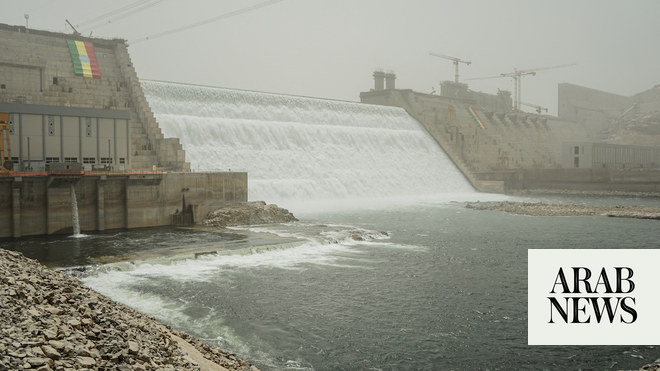
Talks making little progress
CAIRO: Negotiations about the Grand Ethiopian Renaissance Dam will resume on Monday, Ethiopia’s state news agency reported the country’s Foreign Affairs Ministry spokesman as saying.
Talks among Egypt, Ethiopia and Sudan about the controversial multi-billion dollar project have made little progress in resolving outstanding issues.
Egypt and Sudan both fear that the dam, which is being built about 15 km from the Ethiopian border with Sudan, could cause water shortages. Sudan is also concerned about the structure’s safety.
Ethiopia’s Foreign Affairs Ministry spokesman Ambassador Dina Mufti said that the country could not sign an agreement that stipulated the passage of specific quotas of water from the dam to the downstream countries.
Ethiopia’s proposal confirmed its commitment to taking into account the concerns of the downstream countries about droughts that may occur in the future, according to Mufti.
He told a media briefing that Ethiopia was anticipating such concerns and was taking droughts into account and dealing with them, adding that Ethiopia had also confirmed in its proposal that it would continue the stages of filling the dam and not address the issue of sustainable sharing of the Nile’s water.
“Water sharing is not limited to the three countries, there are Nile Basin countries that you must be involved with,” Mufti said.
He expressed Ethiopia’s hope that the negotiations would be successful and that an agreement about the rules for filling the dam would be reached as soon as possible, as he stressed his country’s commitment to continuing negotiations to resolve outstanding issues.
Last week Egypt and Sudan announced the suspension of meetings about the Renaissance Dam and plans to hold “internal consultations on the Ethiopian bid” instead after the release of a letter presented by Ethiopia’s water minister, including draft guidelines and rules for filling the dam. Egypt confirmed that the Ethiopian letter contradicted what was agreed upon in the meetings headed by the water ministers.
Mohamed Nasr Allam, former Egyptian minister of irrigation and water resources, slammed Ethiopia and the African Union’s handling of the current negotiations.
“The recent Ethiopian statements confirm Addis Ababa’s insistence on obtaining a share of the Blue Nile water, deducting from the two downstream countries’ shares, and that it will not sign an agreement to operate the Renaissance Dam,” he told Arab News. “Ethiopia is behaving like a hostile country and is not ashamed of that, and the time has come for Egypt and Sudan to act accordingly.
“The African Union is incapable. My personal belief is that the last stop of the peace process is the Security Council,” he said. “Hopefully the case will be referred to international arbitration while stopping the construction of the dam or issuing a decision to respect the old agreements. With the help of international experts, we can reach rules to reduce harm to Egypt and Sudan, whether in filling or operating the dam.”
Muhammad Mursi, former assistant foreign minister, said the time had come for Egypt to return to the UN Security Council once more given Ethiopia’s position on the dam.
Mursi described Mufti’s statements as “revealing and indicative” even though there was nothing new in them.
“(His statement) reaffirms that Ethiopia is continuing in its defiance and refusal to recognize any rights for Egypt and Sudan, other than what Ethiopia offers us and according to its estimates and interests and without any written commitment.”
The main dilemma with Ethiopia was its refusal to recognize Egyptian rights to the Nile’s waters, he added, and its refusal to sign any document of a mandatory nature with Egypt and Sudan to monitor any control or restrictions on Ethiopia’s complete freedom to build dams and to benefit from the waters of the Blue Nile in the manner that it did.
He believed that the process of filling and operating the dam reservoir was neither the main obstacle nor the most significant in these negotiations.
“We have no other peaceful alternative but to return to the Security Council, after we gave one opportunity after another to solve the problem within Africa, and prior to that dozens of opportunities over many years in the direct bilateral or tripartite framework negotiations,” he said.












